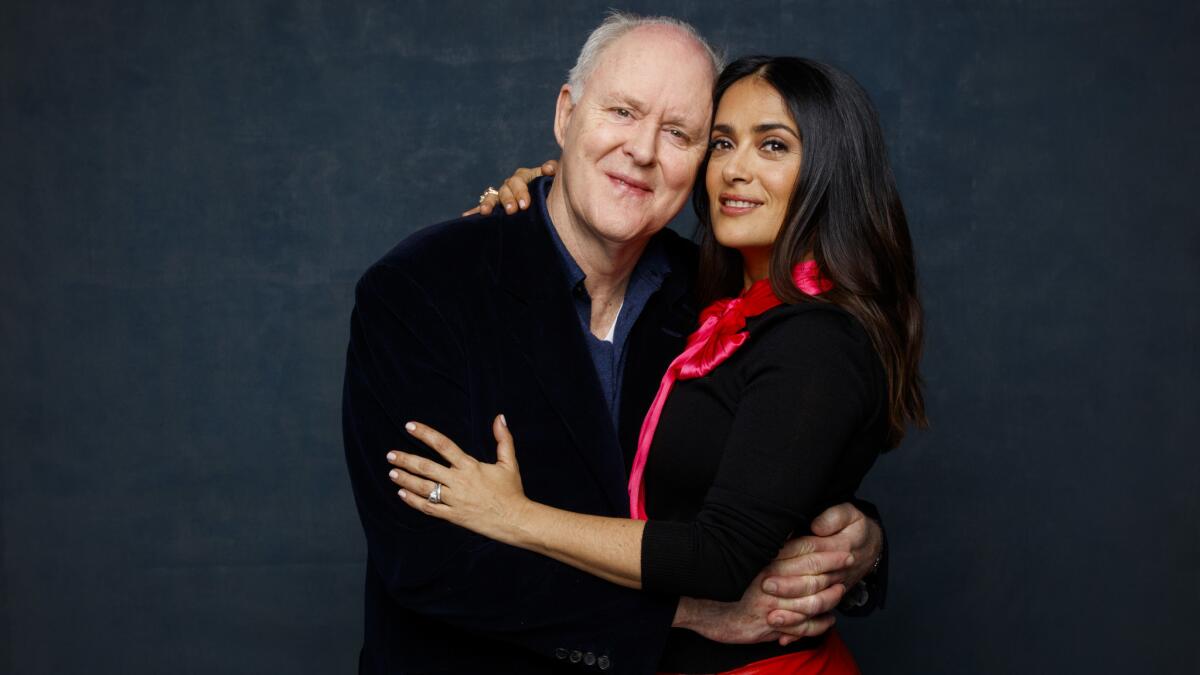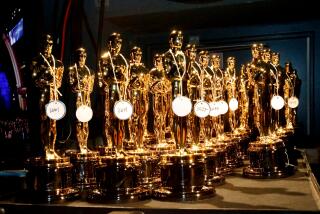Mike White and Miguel Arteta serve up Trump-era allegory in ‘Beatriz at Dinner’
It’s a common feeling, being the odd one out. Writer Mike White seems to have made a career of it, assaying oddballs and misfits and the indignation, righteous and otherwise, that can follow with them. His ongoing on-and-off collaboration with director Miguel Arteta includes the films “Chuck & Buck” and “The Good Girl,” both of which premiered at Sundance, the television show “Enlightened” and now the new movie “Beatriz at Dinner.”
In “Beatriz at Dinner,” which is playing as part of the Premieres section at the festival, White and Arteta again update their exploration of feeling out of place. Salma Hayek plays a masseuse and spiritual healer in Los Angeles who after her car breaks down is invited to stay at her client’s mansion for a dinner party. When one of the guests turns out to be a mega-wealthy, celebrity real estate developer (sound familiar?), two very different worldviews come into contact and conflict.
Hayek’s Beatriz is quiet and watchful while John Lithgow’s performance as the developer is powerful and brash, as both bring an undercurrent of earnestness that avoids tipping into caricature. Connie Britton, David Warshofsky, Chloë Sevigny, Amy Landecker, John Early and Jay Duplass fill out the cast.
The film is by turns wounded and confused, virtuous and angry. Even though it was begun well before the election of Donald Trump to the presidency, the film still has a reeling, decentered emotional core that makes it feel extremely current.
White and Arteta sat down in Los Angeles ahead of the festival to talk about the film over a lunch that included quinoa and tater tots. As to how audiences will take to the distressed social satire of “Beatriz at Dinner,” White said: “Your guess is as good as ours.”
What is it that the two of you like about working with each other? What keeps drawing you back together?
Mike White: I think we have a very overlapping sensibility. There are things that we approach differently, but it’s complimentary. Particularly with this script, but “Chuck & Buck” too and “The Good Girl,” in all my stuff there is a satirical component, there’s a little blood in the mouth. And Miguel approaches it in a very heartfelt way, he finds his way in through the empathy of it. This movie, if it was in more acidic hands, it might just be a grotesquerie, and that’s not what I want. It wouldn’t necessarily be how I would interpret it, but he comes at it in a way that makes sure the emotional underpinning gives it the color that it needs.
Miguel Arteta: I always felt like Mike is writing in a really smart way, just challenging what the priorities of our society are; it always makes you question yourself. So to me, there is a social critique that is done in a very smart way to all his work. It puts you in a place of uneasily questioning your own priorities.
And this movie is the same way. We live in a really polarized world, with two points of view that can’t talk to each other. And the movie is asking you, “What is the appropriate response to the fact that things look really bleak in the world?” I like the smart way he brings a social consciousness to stuff.
In all my stuff, there is a satirical component, there’s a little blood in the mouth.
— Mike White, writer of “Beatriz at Dinner”
Where did the initial idea come from?
White: It was right around the time of that dentist who killed that Cecil the Lion, right then, I was saying I was disgusted by it and I started wondering, “If I was at a dinner party and some guy was like, ‘I’m going to go do this,’ what would you do?” I just thought that was a way in, a funny thing to build out as an idea.
But how did it build from there? Where did the John Lithgow character come from?
White: Well, Trump, at the time, was on the whole thing about Mexican rapists and all that. And there was stuff I wanted to express and I wanted to find a vessel to do it. Growing up here [in Los Angeles], the kind of casual racism and classism, it’s so tough to get at that stuff. Sometimes I just feel like no one really gets at the casual reality of everyday racism … that goes on in Southern California. They think they’re great people and it doesn’t mean that they’re not. It’s just so ubiquitous, “I’m the least racist person in the world.” It so exists.

But then how did you find a way to bring those two characters together?
White: To me, I didn’t want it to be too topical, in the sense it was just about that. So there are these strains of our political culture, to whittle it down to its nubs, which is Beatriz and Lithgow’s character are the extreme poles. It’s not really Democrat versus Republican, it’s just a whole way of approaching the world. What is the ideal person, what is the ideal society — it’s a very old argument. Are we intrinsically good, are we intrinsically bad? Obviously, I have my own opinions about it, and the characters are both armchair philosophers who both live their lives based on their philosophies. While the other people are in the middle and it’s not as conscious.
I think some people will respond to it as a polemic, “Oh, rich people are bad.” There’s going to be a lot of different reactions to it. It doesn’t bother me. Honestly, for me, writing it is catharsis, and my hope is that there are people who will feel a catharsis. It depends on the day, but it’s hard not to feel a little hopeless in the face of these issues that we as a species are facing. And moments like when Trump wins or you see the dentist holding the endangered animal — how do we move forward when so many people think we should be moving back? It is about a communication I want to give to people, but it’s also something that builds up out of you, like “I have to write this.”
Arteta: For me, I want people to come out thinking, “Why have we set up a system of greed that is so all encompassing, [one] that makes it so hard to care about other people and so hard to care about the world?” I want people to just come out and ask, “Why it is so hard to care?” We’ve had four decades of very systemically breeding consumers, breeding selfishness, breeding people to be insulated, and I feel like we’re all victims of that. We’re at a point where if you really want to care, you’re going to feel there is no place for you. To me, the movie laments that.
Has the movie changed for you since the election?
White: I think it would have been the same movie literally on the screen, but I do think that it has a different resonance because of the world we’re in. But everyone is going to have their opinion. It’s going to be as polarizing as the world is.
There’s a part of me trying to figure out how to find the humanism that speaks to me, but also something else. Even in the world of indie movies, now you go into this development stuff and there’s this fear, everyone is a little careful. There is some need to flatter the human race with the movies that we make. And if they’re not flattering, they are villains, they’re not us. And there is a part of me that’s thinks, “No, you’re that person too.”
SIGN UP for the free Indie Focus movies newsletter »
Follow on Twitter: @IndieFocus
Also
‘L.A. Times’ is a spiky portrait of romance in contemporary Los Angeles (and not the L.A. Times)
History and comedy collide with Aubrey Plaza, Alison Brie and Dave Franco in ‘The Little Hours’
More to Read
Only good movies
Get the Indie Focus newsletter, Mark Olsen's weekly guide to the world of cinema.
You may occasionally receive promotional content from the Los Angeles Times.







